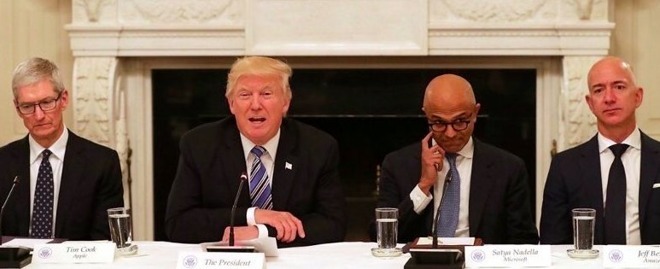Apple CEO Tim Cook was spotted in Washington D.C. on Wednesday, meeting with White House officials and business leaders as part of his role on the American Workforce Policy Advisory Board, with the aim of improving the future prospects of the United States' workforce.
Cook was named as one of the 25 members of the American Workforce Policy Advisory Board on February 13, along with a selection of chief executives from a variety of other industries, education officials, and members of state and local governments. The Apple CEO was seen making a trip to Washington D.C. to take part in one of his first meetings on the board.
As part of his appearance, Cook spoke briefly about workplace training, a subject that surfaced earlier today in the company's 13th Supplier Responsibility Progress Report. The report highlights Apple's educational programs, which provide life skills, vocational certificates, and pathways to college degrees to employees of its suppliers, with training already provided to over 3.6 million participants.
Cook is the most prominent CEO on the list, and is one of relatively few technology companies in attendance. Other firms on the list in the field include Siemens USA, SAP America, and IBM.
The board aims to provide varied perspectives on workforce issues that may face communities and business in the future as well as presently, while at the same time working to raise awareness of ways workers can better themselves to create family-sustaining careers. The group will work with the National Council for the American Worker, providing guidance to ensure students and workers can access affordable and relevant education and job training.
It will also develop a national campaign to promote education and training, recommend specific courses of action for improving the labor market to meet the demands of employers, to produce strategies to improve private sector investments in students and workers, and to establish a culture of lifelong learning.
 Malcolm Owen
Malcolm Owen







-m.jpg)






 Christine McKee
Christine McKee

 Marko Zivkovic
Marko Zivkovic

 Andrew Orr
Andrew Orr
 Andrew O'Hara
Andrew O'Hara
 William Gallagher
William Gallagher





-m.jpg)



10 Comments
Does Tim eat McDonald's Hamboogers?
There's already a petty and pointless political comment from George. Shocking.
Thank you AI for an informative article that is actually free from political bias. These seem like great initiatives, and I'm glad Apple is on board to influence and benefit from them.
I'm going to bite my tongue and refrain from commenting on the facial expressions in that pic.. lol
"Tim Apple" :D
What a prize prat.